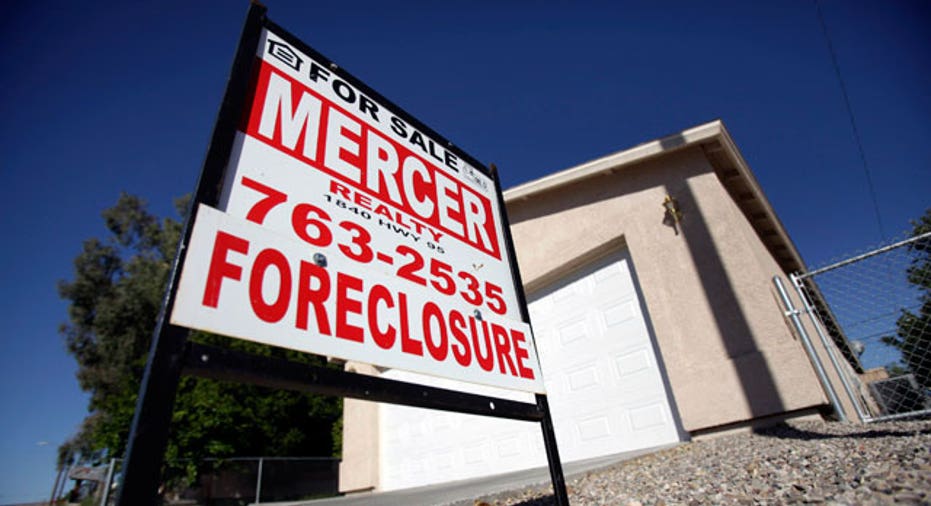Make Sure the Bank Takes Your Foreclosed Home

What happens to a house when the beleaguered owner moves out, and the lender never finishes the foreclosure paperwork?
It becomes a zombie house.
The term "zombie house" applies because the absent homeowner is still legally responsible for the foreclosed property and can be haunted by:
- Property taxes.
- Homeowners association fees.
- Fines for building code violations.
- Other expenses.
A zombie house can be plagued by other problems as well, such as:
- Squatters.
- Mosquito-infested swimming pools.
- Natural gas leaks.
When owners don't know they're still owners
A zombie house is sometimes referred to as a "zombie title" house, but in fact, the title isn't in question, says Daren Blomquist, vice president at RealtyTrac, a real estate data company in Irvine, Calif.
"The public records are very clear that the homeowners still own the property," Blomquist says. "The issue ... is that they are unaware they still own the property, and they are then held responsible for expenses related to that property."
Don't ignore a house in the foreclosure process
Lenders typically aren't required to notify the homeowner when a foreclosure isn't completed. That's problematic for the homeowner, who might not realize that he is still responsible for a foreclosed home that was vacated long ago.
Find mortgage rates in your area
Finding someone who has moved and left no forwarding address can be difficult, but even if the owner is easily found, the lender might not make the effort. That means a homeowner can't just call it quits. Stay in contact with the lender until the foreclosure is completed.
"There's some onus on the homeowner to be proactive and make sure they're going to get information from the lender, and anybody else who wants to contact them, by filling out that change-of-address request," Blomquist says.
Even after moving out, you can research public records to monitor the home's ownership status to make sure it doesn't become a zombie house.
Don't let your house become a zombie
- Tell the lender your new address every time you move.
- Keep tabs on your former home's status via the county recorder's website.
- Offer to sign a deed in lieu of foreclosure.
- Prevent it from falling into disrepair (so it can be sold).
An option: Give it to the bank
A homeowner does himself a disservice by not trying to resolve a zombie house, says Steve Gottheim, regulatory counsel for the American Land Title Association, which lobbies for title companies in Washington, D.C. He says one option might be to sign a deed in lieu of foreclosure, in effect giving the property to the lender.
"If they're willing and ready to move out, there are steps they can take with the lender that will protect them a lot more," Gottheim says. "Consumers need to start recognizing what rights they have and that they need to protect their rights, including the right of homeownership."
Birth of a zombie house
Why do lenders decline to complete foreclosures? "Because they're not on title, they don't necessarily want to get on the property and start maintaining it," Gottheim says.
Lenders have to navigate "myriad mazes of rules and regulations" in each state, Gottheim says. The process can take two years or longer. By then, the house might have little value. So the lender doesn't complete the foreclosure, keeping the title in the owner's hands and creating a zombie house.
"We hear anecdotal stories that, by the time they're able to get close to having a foreclosure sale done and might actually be able to get the property, the house is worth almost nothing, and (lenders) don't want it," Gottheim says. "If the property is in disrepair, it will cost more to get it up to code than (lenders) will ever make off it."
Here a zombie house, there a zombie house ...
As many as 300,000 zombie houses may exist in the United States, and every state likely has at least a few of them, according to a RealtyTrac analysis. The analysis used foreclosure data, and U.S. Postal Service vacancy and change-of-address records to estimate the number of houses in each state that are in foreclosure and no longer occupied.
Florida is "Zombie Central," with potentially 90,556 zombie houses, or about 30 percent of the U.S. total. Next on the list are Illinois, which could have 31,668 zombies; California, home to perhaps 28,821 zombies; Ohio, with about 17,367 possible zombies; and New York and New Jersey, with perhaps 15,212 and 14,084 zombies, respectively.
... everywhere a zombie house
Potential zombie houses are also present in Georgia, Indiana, Kansas, Kentucky, Maine, Michigan, Nevada, Oregon and Washington, where RealtyTrac's data suggest that high percentages of foreclosure properties appear to be vacant.
Why those states? Blomquist offers two possibilities.
- Metropolitan areas such as Atlanta, Detroit and St. Louis tend to have distressed properties that are in such poor condition, neither the homeowner nor the bank wants to own them.
- States such as Nevada, Oregon and Washington have new laws that punish banks for improper foreclosures, causing delays in the process.
Zombie houses are rare in such states as Montana, Vermont and Wyoming, which were not hard-hit by the foreclosure crisis.
Cities try to address the issue
Some cities have set up registries of foreclosed or abandoned properties or enacted local laws that require lenders to perform basic maintenance, but enforcement may be minimal or ineffective, leaving the homeowner with few options.
Copyright 2013, Bankrate Inc.



















